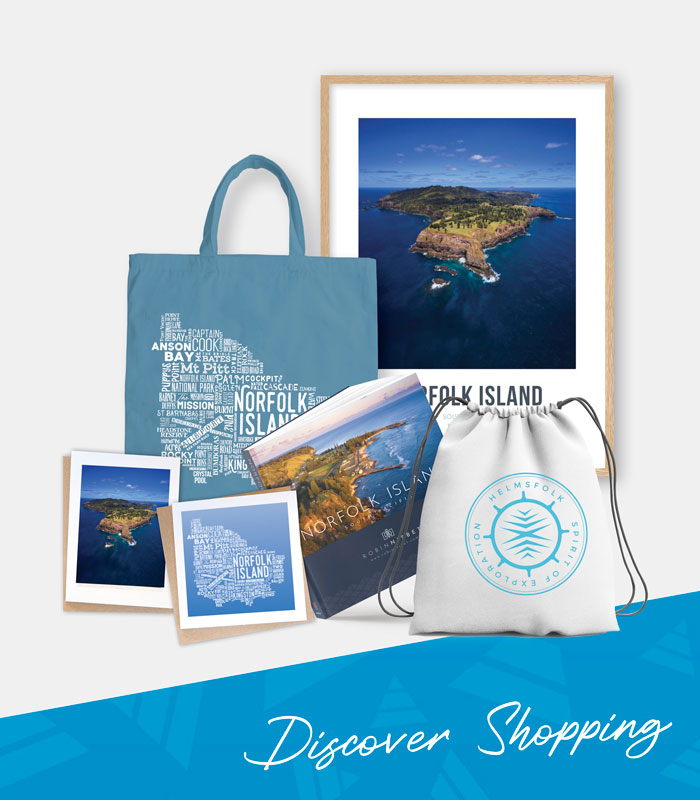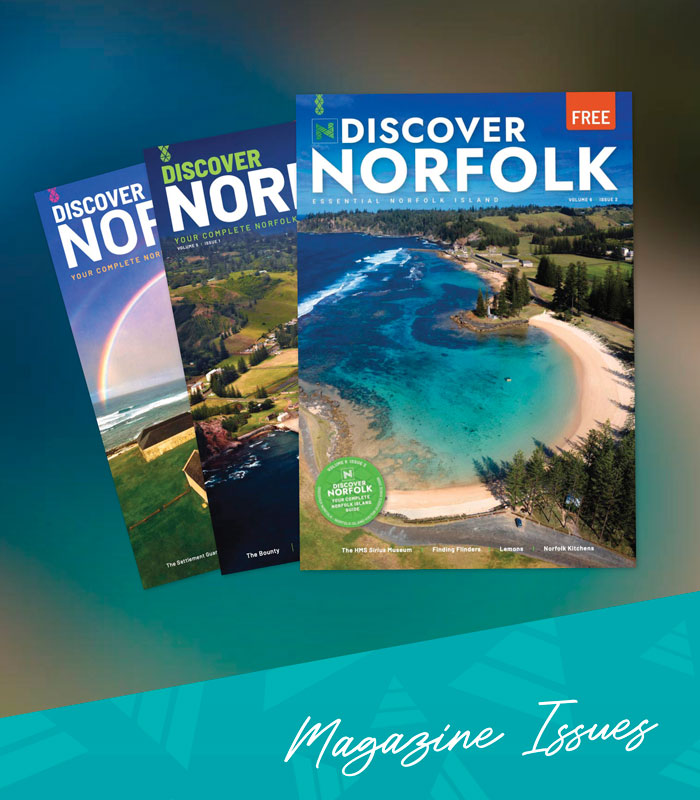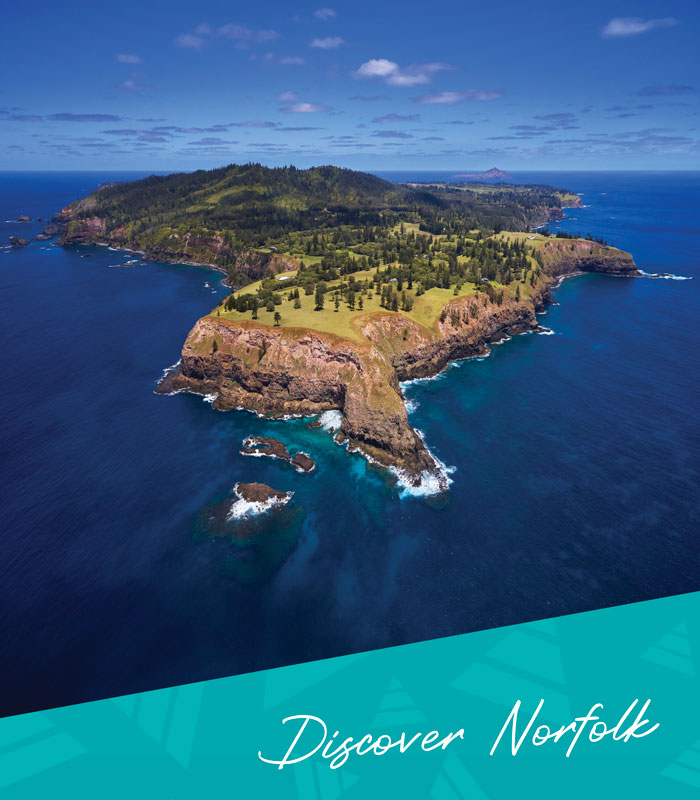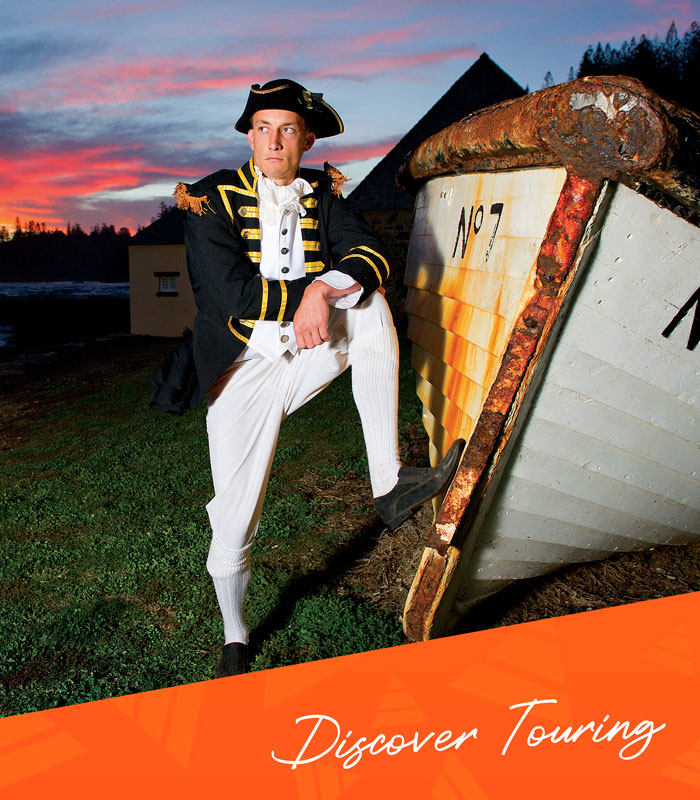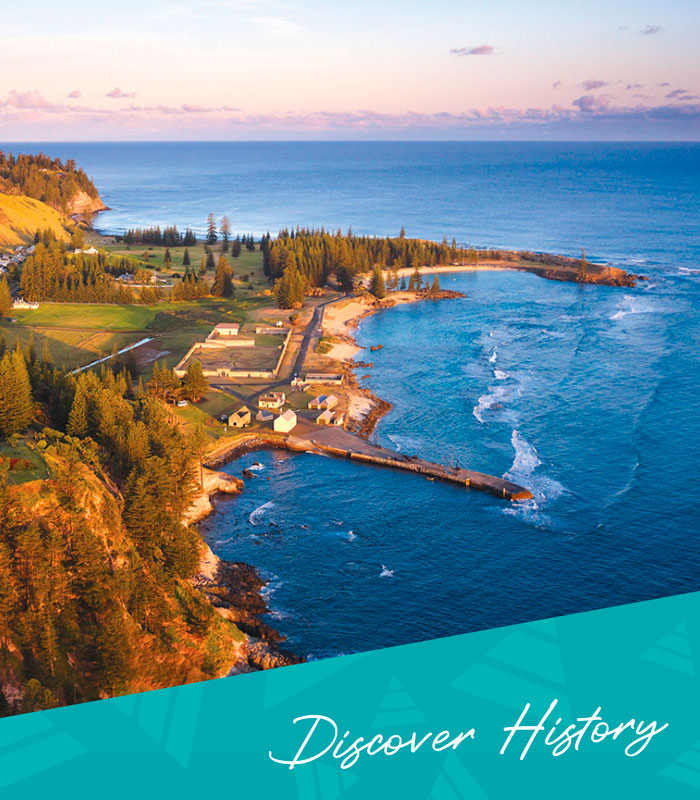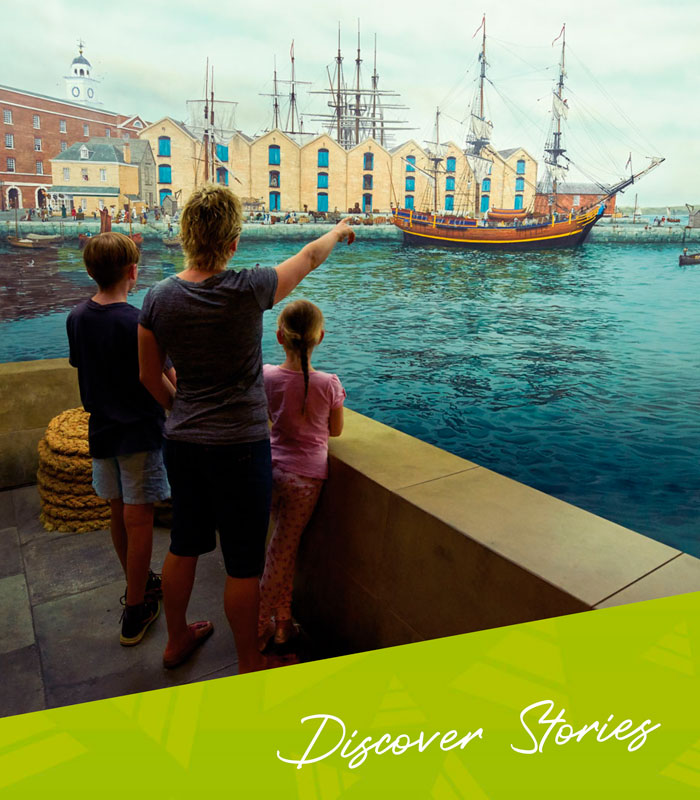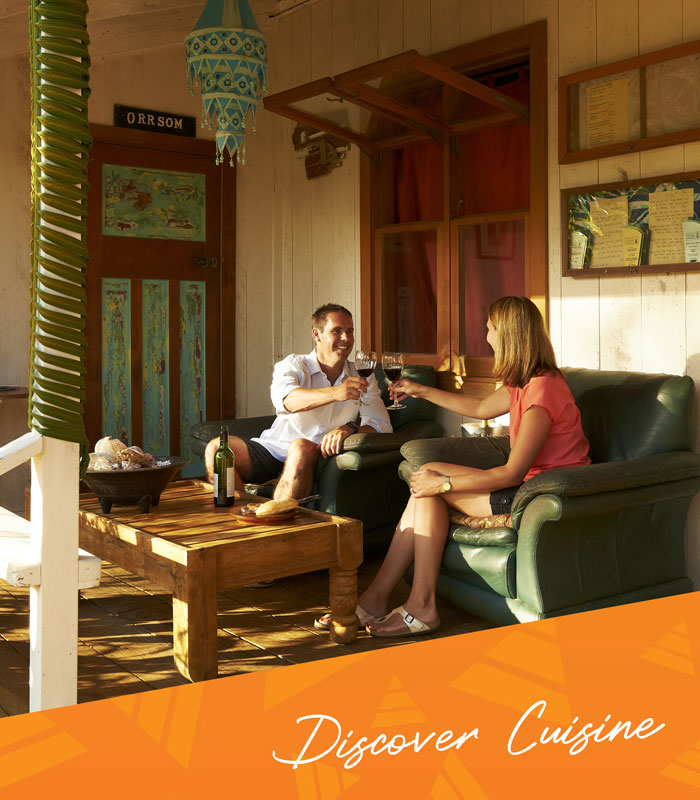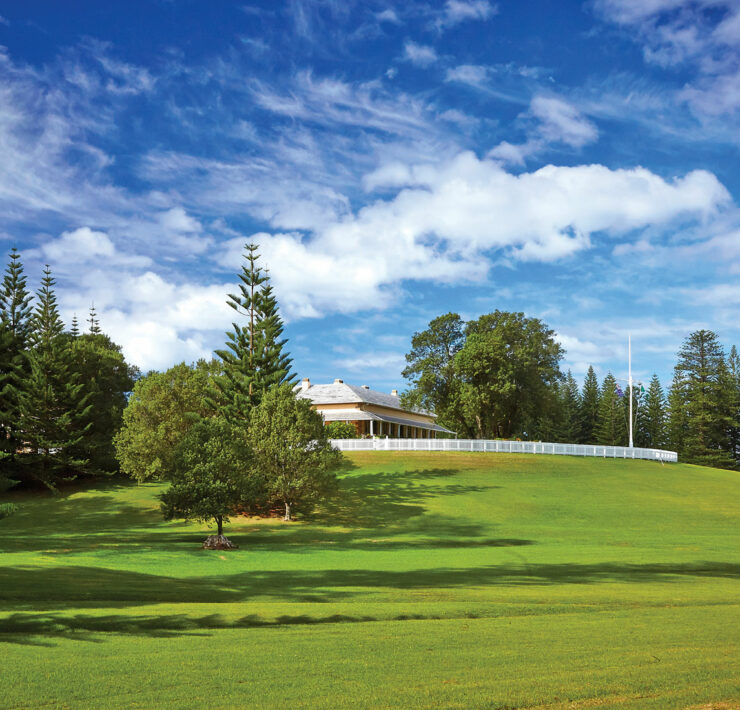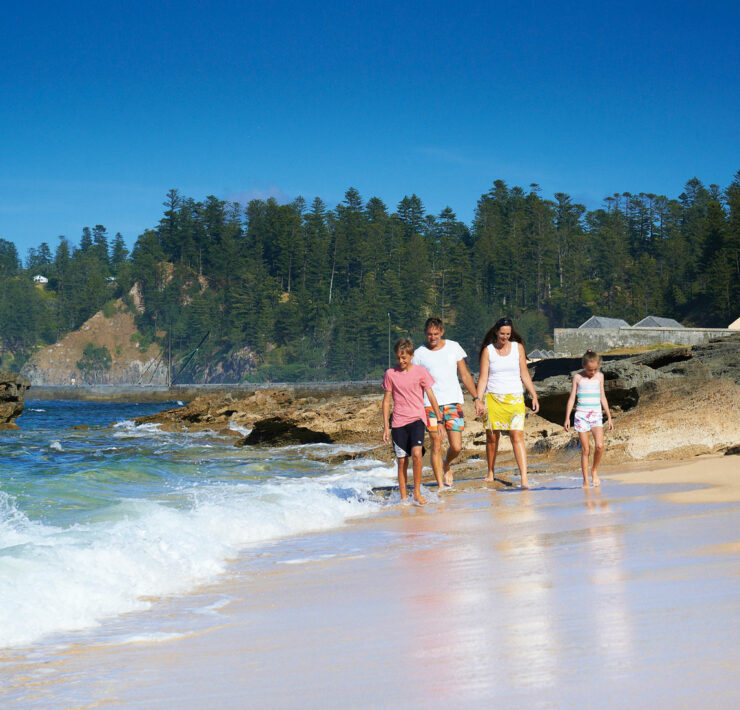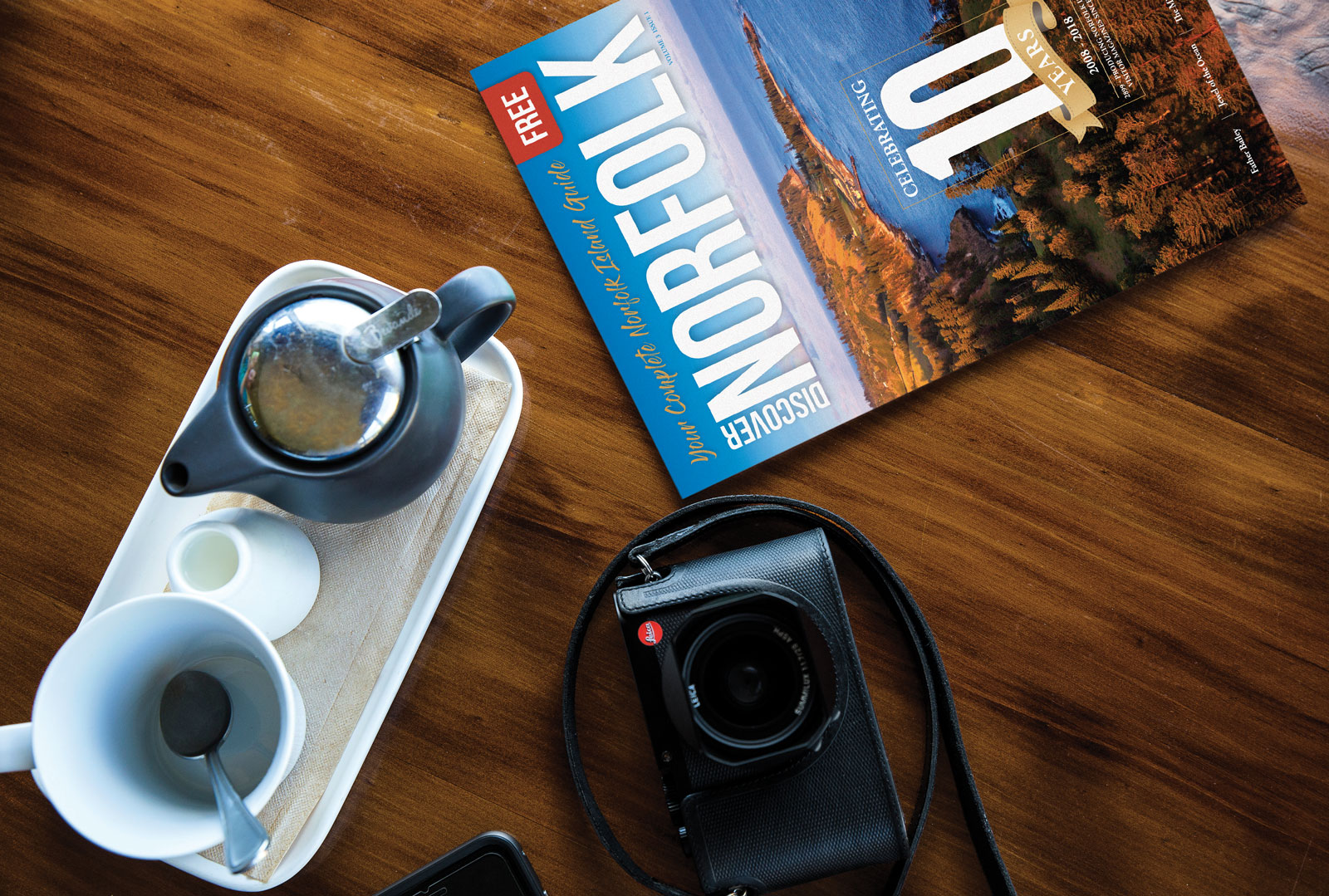Home » All Articles » Working the Ship (Werken ‘Shep)
Working the Ship (Werken ‘Shep)

International travel and globalisation have reduced the novelty of distant places and foreign products, and today most people are probably unaware of where the huge variety of foods and products that they consume come from, or how they are delivered to their local shops. In contrast, on Norfolk Island, the arrival of overseas cargo remains an event, one that demands the involvement of many of the island’s men, and requires that they maintain skills first developed by Norfolk’s early settlers. If you are fortunate enough to be here when a cargo ship arrives, take time out to experience werken ‘shep, and witness one of Norfolk’s unique traditions.
Norfolk lacks a deep water port, so cargo vessels anchor about 1 kilometre offshore, and cargo is unloaded into lighters — open boats about 10 metres in length, and built of Norfolk pine with a hardwood keel, stem and stern. The burdensome lighters, which are specially designed to carry large amounts of cargo to the pier, are towed ashore by motorised launches. While most cargo across the world arrives today in large shipping containers, on Norfolk the small size of the lighters means that cargo is transported from the ship on pallets, or in nets, which are loaded into the lighters. The lighters are then unloaded at the pier using a mobile crane.
When a cargo ship arrives, the local lighterage manager checks the sea conditions and advises the ship’s captain which pier — Cascade pier in the north or Kingston pier in the south — is most suitable for unloading. The times and pier preference for ship unloadings are broadcast on the local radio, and visitors are welcome to watch the unloading operations.
Any livestock on board the ship will be unloaded first. The animals are carefully lifted into the lighter using the ship’s crane, and gently cajoled as the lighter moves from ship to shore. Afterwards, the other cargo is unloaded. Pallets are lowered into rope nets within the lighters. Timber, steel and other heavy cargo is slung with wire rope and heavy-duty nylon straps. On a good day, an average of 600 tonnes can be unloaded, which is faster than the ship can be loaded in Australia or New Zealand. Oversize cargo — such as buses, tractors, and large bundles of timber — is brought ashore by tying two lighters together, which greatly increases their stability.
The lighterage operation is a major source of part-time work for island men and can be very hazardous. The water at both Cascade and Kingston piers is shallow — 1 metre or less at low tide — and the approach to Kingston pier from offshore is around the end of a reef which often experiences a 1–2 metre swell. As a result, exiting and entering the pier demands expert boat handling skills and seamanship. Rough seas and heavy swells make the task even more dangerous. Timing is particularly important in rough seas, when it is crucial that the right moment is chosen to enter the Kingston pier area.
Elders who drive the launch teach that the pier should only be approached if the moo-oo reef on Phillip Island (in the distance and to the right, as viewed from the lighter) is visible. Otherwise, the lighter must not proceed, as a heavy swell is approaching. The motorman on the launch times the approach to match the swells. He controls the speed of the lighter using the launch’s engines, slowing while large swells pass and then advancing the throttle when the waves allow an approach to the pier. The lighters are steered alongside the pier using a sweep (long oar), rather than being towed or pushed by the launch. The lighter is secured to the pier with bow and stern lines that are tied to the bollards, after which the cargo can be unloaded.
Men learn to werk ‘shep by watching veterans, as Norfolk Islanders have done for generations. When honed, the men’s skills become (and look) automatic, but reflect a deep knowledge of the ocean and long experience. “Knowing the sea” recalls the unique knowledge, skills, and spirit of the first Norfolk Islanders, who were seafaring pioneers that combined the traditions of Polynesia and those of the Bounty mutineers. Polynesians were renowned for using stars and wave patterns for navigation, and made long voyages between the distant islands of the Pacific, well before European explorers made their own great voyages of discovery.
Reflex and instinct are important skills as well, but these need to be developed in new recruits. Thus, a well-known tip is given to new recruits: “When I say jump, you jump!” (at times people have jumped into the sea to avoid being hit by swinging cargo). Werk ‘shep is a team effort. It’s made to look effortless, with seamanship and skill taken for granted. If you stopped one of the local men and asked them to explain their skills, they might find it hard, answering ”We just do it.” But although the men on Norfolk don’t think of it as special, werk ‘shep it is a skill of heritage, one passed down over generations.
The arrival of a ship is a welcome event, as by the time the ship arrives, stocks may be running low, and shops may have completely run out of certain products. Mail that was feared to have been “lost in transit” to the island miraculously turns up in the ship’s mail, while parcels and letters, or goods ordered many months ago are received unexpectedly, producing broad smiles on the faces of the recipients.
On Norfolk we take the process of unloading the ship for granted. Men on the island drop all full-time work commitments and head off to werk ‘shep, returning home at dark physically exhausted, and feeling the roll of the ocean waves as they walk. In the morning they get up and do it all over again… and so on each month, keeping an important Norfolk tradition alive, and enabling our unique way of life.
BREAKOUT BOX – Shippping Produce
The islander’s lifestyle dating from the arrival of the Pitcairners, was dependent solely upon subsistence farming and fishing, As a community today we are reliant upon the shipping of goods, balanced with what we can grow ourselves. The importation of fresh produce is restricted to potatoes, garlic, onions and ginger. As only certain goods can be shipped to the island, the quality of patience is a virtue when living here. You just need to wait until the next lot of goods arrive, “…on the next ship”.
In the late 1970’s a food cooperative was formed by local Norfolk families. Called ‘Famco’, the organisation purchased bulk orders from New Zealand. Young mothers and fathers volunteered their time to place orders, sort prepayment and then when the ship arrived, it was off to the pier to collect the goods, double-check the order, and allocate the percentage per item of shipping and duty charges. Then, the next step for volunteers was to stack shelves and host the shop in what was known as “The Bean Shed” for those families calling in to collect their order or complete home deliveries of the items bulk ordered. It was a time of all working together to share and minimise the costs of living. Nowadays there are a variety of island based businesses who import all manner of goods for resale.
Our lifestyle of subsistence farming and fishing on this small isle, means we accept the restrictions placed upon the shipping of goods. These ‘restrictions’ are of great benefit to our health where our diet is seasonal.
Rachel Leslie – A Cup of Life Holistic Health Counselling quotes “……For centuries, Ayurvedic practitioners as well as ancient Chinese herbal doctors have followed a diet of the seasons. …….In today’s world industrialization has made it possible to have all foods at all times of the year. ……. Eating seasonally brings us back to our roots, back to a simpler time when we ate what we had, and what we had came from a local farm.” This is how we live on Norfolk whereby local crops are produced throughout the seasons of the year. Farmers rotate their crops in growing cycles and this allows for optimum nutrition being absorbed by our fruits and vegetables. The health of the soil is maintained and we contribute to a sustainable environment.
Image Credit: Robin Nisbet
www.robinnisbet.com
____
Article content disclaimer: Article first published in 2899 Magazine V1 Iss3, 2009. Please note that details of specific travel, accommodation and touring options may be outdated. References to people, places and businesses, including operating days and times may be have changed. References to Government structure and Government businesses/entities may no longer be applicable. Please check directly with businesses and/or Government websites directly rather than relying on any information contained in this article before you make travel arrangements.


